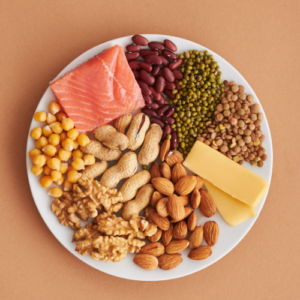
Whether it’s an easy or a particularly strenuous workout, deciding what to eat afterward may be more important than you think. The main reason you should eat after exercise is that it replenishes what was lost during the workout. Of course, most people know that consuming a lot of calories post-exercise can have a canceling effect both on the weight maintenance benefits and purpose of the workout. But, if you find yourself starving after working out, what are the most satisfying and nutritious food options? Which should you focus on and which should you avoid? Let’s explore:
When deciding what to eat after a workout, it is crucial to think about something called macronutrients. Macronutrients are the types of food that should make up the majority of a diet: carbohydrate, proteins, and fats. Carbohydrates are an essential energy substance that is needed to speed up recovery time and delay fatigue following a workout. Carbohydrates are crucial to restore muscle glycogen stores and minimize exercise-induced hypoglycemia (blood sugar deficiency in the bloodstream). Carbs not only help in recovery but also in maintaining post-workout energy levels. Endurance cardio types of workouts benefit from more carbohydrate-rich snacks. Not all carbohydrates are equal, however. As an example, opt for a whole-wheat toast after exercise, not a donut.
Amino acids and proteins are integral for post-exercise muscle protein synthesis. Exercise triggers the breakdown of muscle protein, especially those exercises that include resistance training. High-quality protein sources like milk, eggs, soy, wheat, and peas can help restore and recover. As for the fat part of the macronutrient equation, again focus on quality. Salmon is an excellent example of a post-workout recovery food that is high in protein and heart-healthy fats like omega-3s. Bonus? These heart-healthy fats are also known to decrease the muscle inflammation that causes you to feel sore after a workout.

Hydration is also vital after any exercise. Specifically, water is an important nutrient which should be replenished after a workout as varying amounts are lost depending on the intensity of the activity. The right amount to drink should be dictated by the balance between the water intake and the water losses during your workout session. One way to calculate how much you need is to weigh yourself before and after a workout. Then, drink two-to-three cups of water for each pound lost while working out. If the exercise session has lasted an hour or less, then water is all you need to replenish. If the workout was longer than an hour, however, then an option like coconut water can help you to replace the electrolytes that were lost while sweating through a long exercise session.
Post-workout snacks should be about 150 calories working in a 3:1 ratio of carbohydrates to proteins after a workout that is an hour or longer. If you worked out before a meal, you should have a healthy, well-balanced meal post-workout instead. General rules to optimize post-workout eating include avoiding too much fat and excessive calories. Too much fat can slow down digestion, and excessive calories may be counter-productive to your workout goals, possibly even resulting in weight gain.
The primary reason to eat after a workout is to replenish what’s been lost during exercise, as well as to aid in recovery. You not only want to restore depleted glycogen stores, electrolytes, and fluids. You also must work on repairing damaged muscle tissue and building lean muscle mass. Focusing on the right types of foods to replenish those macronutrients is essential. Once you make eating them a habit, it may also help in enhancing your exercise performance in the future.
Source:
https://www.webmd.com/fitness-exercise/ss/slideshow-foods-for-workout






